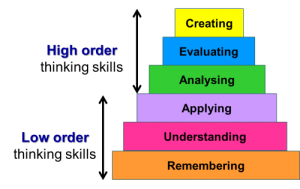Learning objectives are specific descriptions of the most important skills students will gain by taking your course. When writing course and lesson Learning Objectives:
- Begin your list of objectives with the phrase, “After successfully completing this [lesson/course], you will be able to: ____”
- Use the following list of measurable action verbs based on Bloom’s Taxonomy
- Align your objectives and assessments. Make sure that each objective is something you will directly measure with some form of assessment, and that each performance assessment is reflected in the objectives.
- List learning objectives on your course syllabus
Related Resources
- Getting Started with Writing Learning Outcomes (external)
- Alignment – teaching strategies, assessment and learning outcomes (external)
- How to Write Learning Objectives (external)
Bloom’s Taxonomy: Action Verbs
A group of educators led by Benjamin Bloom, identified a hierarchy of six categories of cognitive skills: knowledge, comprehension, application, analysis, synthesis and evaluation. As students learn, they start with the knowledge level and progress through the hierarchy. Thus, advanced courses should include skills at a higher level than introductory or basic skills courses. Below you will find a list of measurable verbs to assist you in writing course objectives and assess learning outcomes.
Hierarchy of Thinking Skills

List of Measurable Action Verbs
| list | record | underline |
| state | define | arrange |
| name | relate | describe |
| tell | recall | memorize |
| recall | repeat | recognize |
| label | select | reproduce |
Comprehension Level
The successful student will restate or interpret information in their own words.
| explain | describe | report |
| translate | express | summarize |
| identify | classify | discuss |
| restate | locate | compare |
| discuss | review | illustrate |
| tell | critique | estimate |
| reference | interpret | reiterate |
Application Level
The successful student will use or apply the learned information.
| apply | sketch | perform |
| use | solve | respond |
| practice | construct | role-play |
| demonstrate | conduct | execute |
| complete | dramatize | employ |
Analysis Level
The successful student will examine the learned information critically.
| analyze | inspect | test |
| distinguish | categorize | critique |
| differentiate | catalogue | diagnose |
| appraise | quantify | extrapolate |
| calculate | measure | theorize |
| experiment | relate | debate |
Synthesis Level
The successful student will create new models using the learned information.
| develop | revise | compose |
| plan | formulate | collect |
| build | propose | construct |
| create | establish | prepare |
| design | integrate | devise |
| organize | modify | manage |
Verbs to Avoid
Updated 02/09/2024